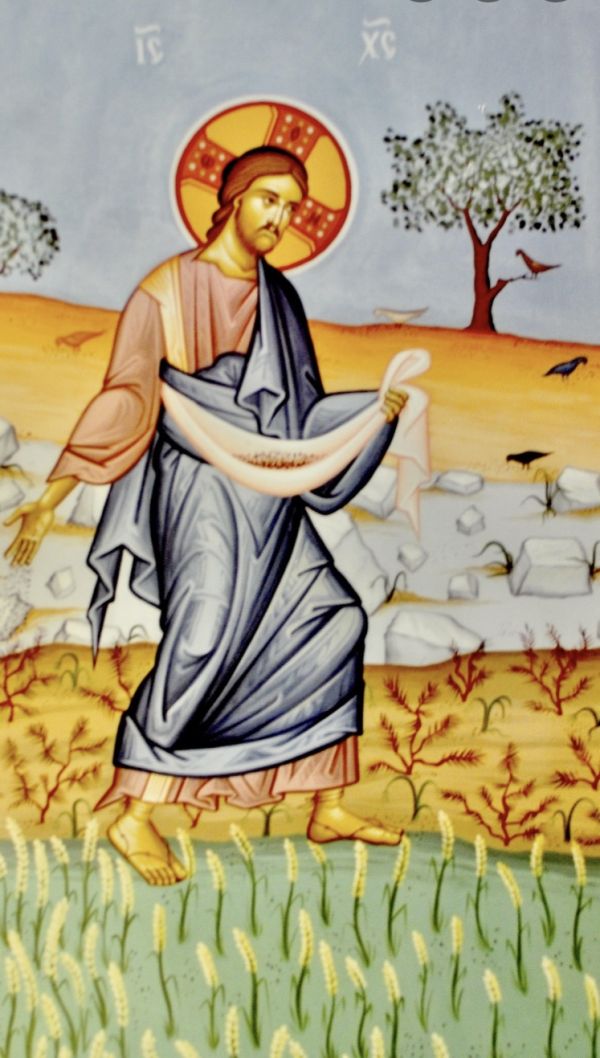In the difference between common religiosity and Faith
(Lk 8:4-15)
The parables compare the lived reality and the world of the Spirit:
«And another part fell on the earth the beautiful one, and sprouted it bore fruit a hundredfold» (v.8).
Palestine’ stony terrain and scorching climate did not make it easy for the workers who lived on agriculture.
The lack of rain and the intrusion into the fields of those who wanted to shorten the path, destroyed the plants.
Tiring action and few tangible results.
Despite the enormous difficulties, every year the peasant threw grains with a wide hand, generously - and ploughed, animated by confidence in the inner life force of the seed and in the bounty of nature.
Ploughing was after sowing, to avoid that the soils turned over dried immediately under the powerful heat, and did not allow the grains to take root thanks to a minimum of moisture.
So the sower didn’t select the different types of ground prematurely.
The Seed already works: the new ‘Kingdom that Comes’ is not glorious, but here and there it takes root and produces - even where you do not expect.
According to the ancient religious mentality it seems a madness, but the divine Farmer does not choose the type of "land", nor discriminates on the basis of the percentage of production - although it would seem easy to predict.
The Sower even accepts that his ‘grain’ fallen on the ground «beautiful», fruits in differently: one hundred, sixty, thirty for one [Mt 13:8.23; Mk 4:8.20; the text of Lk doesn’t speak of percentages].
The term «beautiful» (in the Eastern sense) means the full and fruitful land [the soul and work of the most intimate, even anonymous ones].
The Lord means that a wise commitment to evangelization cannot be measured with fussiness.
His Word remains as a Beginning thrown into the human heart by the One who is neither stingy nor exclusive - but magnanimous.
In this way, the Church, his new People, is a small alternative world to both the Empire and selective religions.
The new Rabbi did not intend to carve out better disciples than others - isolated from the reality of the human family.
He was proposing a new lifestyle, cohabiting.
In short, God doesn’t force the growth of the ‘seed’ in each of us, in an abstract way; He waits patiently.
Even accepts that it is born badly or that it does not arise at all. He knows where to go.
Since overflowingly spreads on all kinds of hearts (even on asphalt), He foresees already that will be accused of being unwise.
But He doesn’t worry about the quantity, nor about the immediate outward fruits of His ‘grain’.
He doesn’t care that the work is "effective in departure"!
Such is the amiable, humanizing and divine (parental) Tolerance that saves. Loveableness that does not kidnap us every moment, to plan.
Rather, all this is to make us understand that He is not a calculating and miserly God, external, tight and biased; but a munificent and conciliatory Father.
Lord of the Kingdom who does not wait first for our little ‘perfections’.
The metaphor that follows the initial parable is intended to emphasize that any lack of result is not to be attributed to the lack of vitality of the Seed, nor to the divine Work, but to man’s freedom; to his condition of limit or incoherence.
Unfortunately, from the earliest generations of believers, the positive Call of Jesus has been reinterpreted somewhat backwards: with moralistic and individualistic overtones (vv.11-15) that have undermined its genuineness.
In this way, the initial proposal of personal Faith became contaminated with the customary purist and fall-back [guilt-ridden] outlook typical of the surrounding philosophies and religions, as well as common thought.
Certain configurations of ecclesial order subsequently normalized the same exceptional power of the Message; so unprecedented. In particular, the new sense of adequacy, confidence and self-esteem that the Son of God intended to communicate to His friends, and to the world of the least.
[Saturday 24th wk. in O.T. September 20, 2025]












